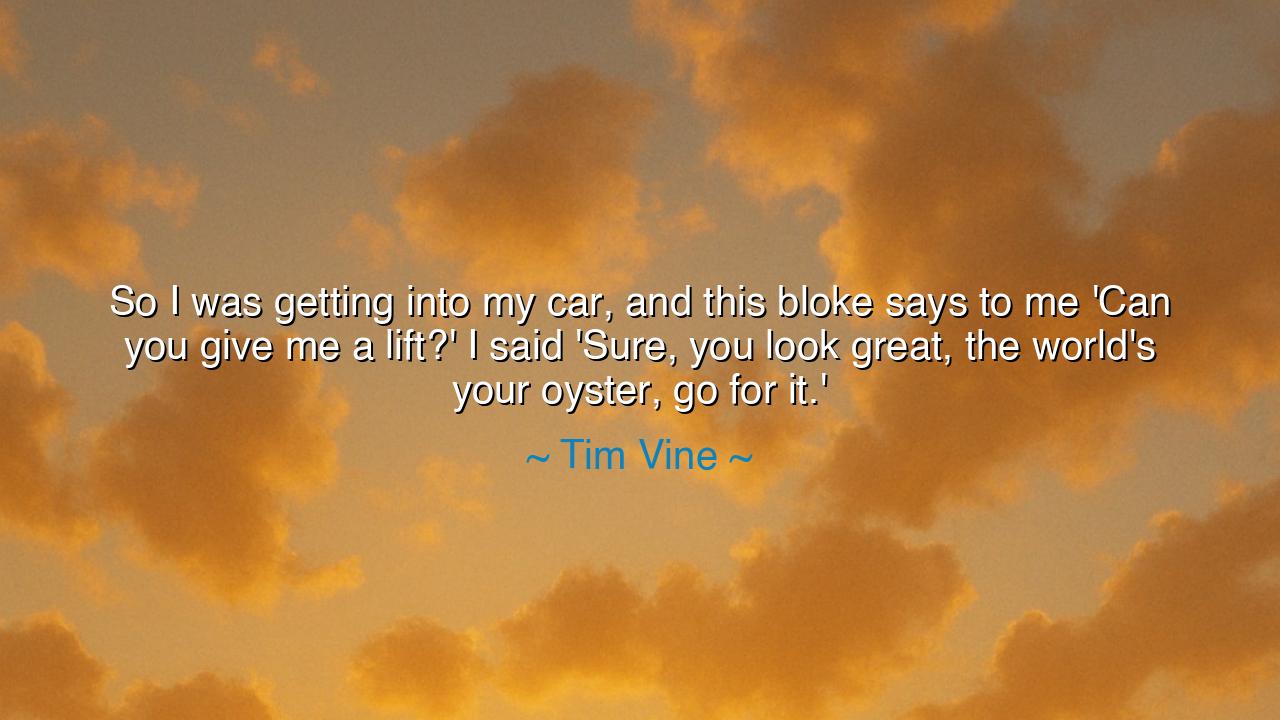
So I was getting into my car, and this bloke says to me 'Can you
So I was getting into my car, and this bloke says to me 'Can you give me a lift?' I said 'Sure, you look great, the world's your oyster, go for it.'






The words “So I was getting into my car, and this bloke says to me, ‘Can you give me a lift?’ I said, ‘Sure, you look great, the world’s your oyster, go for it,’” spoken by Tim Vine, seem at first a simple jest — a play on words, a flash of quick wit meant to amuse. Yet beneath their humor lies a truth that echoes the teachings of the ancients: that perspective transforms reality, and that the ability to find joy in language, to see possibility in the ordinary, is itself an act of wisdom. For humor, when born of kindness, is not trivial — it is a form of light, one that illuminates the absurdities of life while teaching us to bear them with grace.
To “give someone a lift” can mean two things: to carry them physically or to raise their spirits. In Vine’s playful twist, he chooses the latter, transforming a mundane request into a moment of encouragement. The man who asked for a ride was expecting transportation, but what he received was affirmation — a verbal spark reminding him of his potential, of his place in the vast tapestry of the world. “You look great,” he says; “the world’s your oyster,” he continues — these are not mere words of flattery, but a comic blessing, a jest wrapped in generosity. Through laughter, Vine teaches that we can elevate others not only with deeds but with words, and that the smallest exchange, when delivered in good spirit, can become a moment of connection.
The ancients knew the power of wit as a divine gift. In Greece, the philosopher Diogenes used humor to reveal hypocrisy and truth; his jokes, sharp yet wise, exposed the folly of kings and scholars alike. When asked what he sought while walking through the streets with a lantern in daylight, he replied, “I am looking for an honest man.” Like Vine’s humor, Diogenes’ jest carried double meaning — laughter for the surface, enlightenment for those who looked deeper. The wise among the ancients knew that humor is not the enemy of truth, but its companion; that by laughing at life, one learns to accept its contradictions, its absurdities, and its fleeting nature.
Tim Vine’s style belongs to this same lineage — the jester as philosopher, the one who makes men laugh while quietly teaching them to see differently. In his pun, he transforms misunderstanding into revelation. The man seeking a ride finds himself instead reminded of his worth and of life’s limitless potential. “The world’s your oyster,” Vine says, echoing a phrase that traces back to Shakespeare, who in The Merry Wives of Windsor wrote, “The world’s mine oyster, which I with sword will open.” There, the words spoke of ambition and conquest; in Vine’s voice, they speak of optimism and possibility. Thus, through jest, he turns ambition into encouragement, inviting his listener to see the world not as a battle to be fought, but as a feast to be discovered.
And yet, there is a deeper wisdom in Vine’s playfulness — the wisdom of light-heartedness in a heavy world. To jest is to refuse despair, to claim agency over life’s confusion. The man who can laugh is not blind to suffering, but he refuses to be crushed by it. The laughter that Vine inspires is not shallow; it is a reminder that even in misunderstanding, there can be warmth. The ancient Stoics would have understood this well — they, too, taught that one must meet misfortune not with anger, but with composure and humor. To laugh is to remain unbroken, to remind oneself that life’s meaning is not in control but in perspective.
One may think of Abraham Lincoln, who in the darkest days of the American Civil War, was known for his gentle humor. He once said, “I laugh because I must not cry.” His jokes, like Vine’s, were not mere diversions but acts of resilience — moments of humanity that allowed him and others to endure. In every age, those who can make others laugh hold a subtle power: they heal wounds that cannot be mended by logic or force. Their words, though light as air, carry the strength to lift hearts weighed down by gravity.
So, let this be the lesson: do not underestimate the sacred art of humor. A pun, a smile, a well-timed jest — these are not trivial things but bridges between souls. Like Vine’s response to the stranger, let your words be ones that lift others, that remind them of their worth, that open a window of joy in a weary world. To give someone a ride is good; to give them hope is divine. And so, as you walk among others, remember the wisdom hidden in laughter: that even the simplest words, spoken in kindness, can make the world lighter — and in doing so, make you part of its enduring joy.






AAdministratorAdministrator
Welcome, honored guests. Please leave a comment, we will respond soon